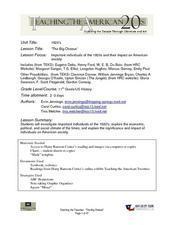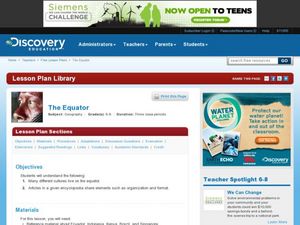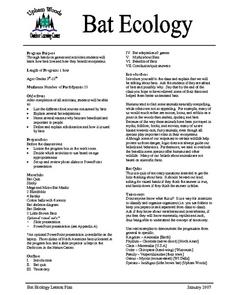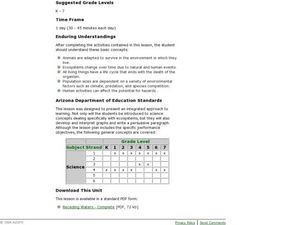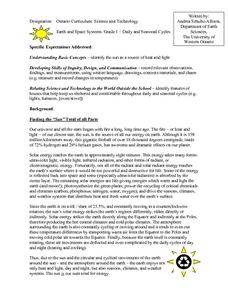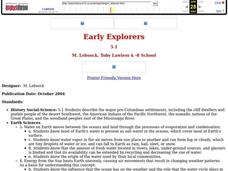Curated OER
Natural Features of Our Community
Second graders read about and discuss natural features of communities. They listen to a guest speaker, such as a park ranger to expand their knowledge of natural features. They go on a field trip, if possible, to a local zoo or...
Curated OER
Animals, Soil, Trees
Fourth graders describe the various kinds of soils and how plants and animals are affected by them. They describe the baic needs of plants, scoring at least a 3 or 4 on a 4-point rubic. Students are able to predict and/or infer what...
Curated OER
THE BUSINESS OF CLEAN AIR
Students determine that air pollution control is caused by a combination of market incentives and government regulation. They realize that businesses exist to make profits for their owners and that governments make rules for individuals...
Curated OER
"The Big Cheese"
Eleventh graders research and examine the significant individuals of the 1920s and their impact on American society. They identify characteristics of people who make a difference, and in pairs conduct research on two people with...
Curated OER
The Equator
Learners investigate cultures located along the equator. In this geography skills lesson, students research the geography, history, culture, and tourism of Ecuador, Indonesia, Kenya, Brazil, and Singapore. Learners write an article based...
Curated OER
The Affects of Environment on Native American Culture
Students research the culture of the Native Americans. In this U.S. History lesson, students are given the major geological areas where the Indians lived prior to the arrival of the Europeans, then they create a notebook that compares...
Curated OER
Bat Ecology
Students, through hands on games and activities, discover how bats live and how bats benefit ecosystems. They play a game designed to show them how echolocation works and another to show how mother bats locate their young through their...
Curated OER
Receding Waters
Students explore the effect of environmental factors on ecosystems. In this wildlife and ecology lesson plan, students identify and describe the stages in a frog's life cycle. Students participate in a simulation demonstrating the...
Curated OER
King Cotton
Fifth graders explore the cotton plant. In this cotton lesson, 5th graders research the process of growing cotton. Students explore the economic and cultural differences in the states that grew cotton for trade and industry.
Curated OER
Biological Sciences
Students examine biodiversity and interrelatedness concepts. In this ecology lesson students go on a field trip and fill out a data sheet.
Curated OER
Geoscience Careers
Young scholars explore the world of geosciences and all the career possibilities and options that this field of study offers. They relate this field to engineering and other health professions. Each student utilizes technology to assist...
Curated OER
Floodplain Modeling
Students simulate the impact of fluctuating river volumes on structures and landforms. They experiment with table top-sized riverbed models and water. Students consider how human design can help mitigate the effects of a flood.
Curated OER
Lives of Native Americans and Settlers
Students assess the effect of contact between the Native Americans and Europeans after 1492. They explore the lives of the early European colonists and the Native Americans living along the East Coast of North America. Lesson contains...
Curated OER
Daily and Seasonal Cycles
First graders identify the sun as a source of heat and light. They identify features of houses that help keep use sheltered and comfortable throughout daily and seasonal cycles. Students are told that summer is the best season to...
Curated OER
Ecology
In this ecology worksheet, students read information about ecology and the nine ecology subdivisions and answer comprehension questions. Students answer ten questions in this matching and fill in the blank worksheet.
Curated OER
The Wild, Wild West, or Was It?
Fifth graders explore the American West. In this Westward Expansion lesson, 5th graders examine the opportunities that the West offered American pioneers. Students watch a montage video and analyze primary documents regarding the topic.
Curated OER
Kensington Mansion: Plantation, Sharecroppers, Tenants
Eleventh graders investigate the significance of the Kensington Mansion. In this South Carolina history lesson plan, 11th graders take field trips to the mansion and research primary and secondary sources about plantations,...
Curated OER
Early Explorers
Fifth graders study early explorers. In this World history lesson, 5th graders draw an outline of a map labeling each part, build geographical features out of dough, and paint each of the land and water features.
Curated OER
Global Warming: The Greenhouse Effect Visualizer
Students work in small groups to study the various aspects of global weather and discuss the possibility of a Greenhouse Effect.
Curated OER
How Does Temperature Vary Over Time?
Students examine the temperature flucuations on the Earth. After defining new vocabulary, they identify the flucuations of the Earth on a map. As a class, they develop a hypotheis on the temperature variation by examining the data.
Curated OER
Unit on Globalization and the Environment
Twelfth graders analyze issues affecting ecosystems. They examine the relationships between members of the international comunity. They also examine the concept of sustainable development.
Curated OER
The Greenhouse Effect
Eighth graders research the Greenhouse Effect on the Internet. They use a variety of sources and take notes on the topic. They use ClarisWorks to type a report, use spellcheck, proof and edit. They can create a class bulletin board.
Curated OER
Ice Core Research
Students study the work of Dr. Hajo Eicken through an audio conference. They engage in a conference call with Dr. Eicken to identify how ice core research is designed and conducted. After asking Dr. Eicken questions, they record their...
Curated OER
Doing Science: Computer Models
In this computer models worksheet, students read information about how scientists use computer models to advance the work of science. Students also answer a critical thinking question comparing computer simulations to direct observations.





